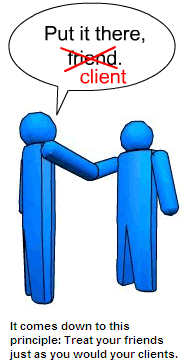| |

Friends can be the worst clients without even trying
Scott Manning
May 20, 2002
|
or "How to keep friends that want to be your clients".
 About three or four times a week, I come across an email or a post on a message board that says: About three or four times a week, I come across an email or a post on a message board that says:
"I agreed to do a project for a friend of mine. It was going to be an easy job and since he was my friend, I decided to give him a good deal (really cheap or for free). After about four months, I realized that this 'easy' job was much more than I expected. I didn't charge enough money and I don't know how to tell my friend he's demanding too much. After continually changing his mind, we ended up doing what I originally suggested, but he wouldn't listen! I don't want to lose my friend, but I'm losing my mind. What do I do?"
I think everyone has, at least once, done a 'favor' for a friend. Nine times out of ten, these favors turn into nightmares. Have I experienced this? Sure. I did one that made me vow never to do jobs for friends again. After I calmed down, I decided that I would find a way to successfully do work for friends without losing my sanity (or what's left of it).
A year later with a lot more experience under my belt, I have found a way to do work with friends, keep those friends, and keep my sanity. It's not as complicated as you might think, but requires some hard ball on the designer's part. It comes down to this principle:
Treat your friends just as you would your clients.
The perspective that prevails from both designers and their friends is that the designers should cut the friend a break. Although, a designer may give a friend a discount, that doesn't mean they should change their business practices.
However easy that may sound to you, I'm going to cover a few points that all designers should remind themselves of when doing work for a friend.
1. A handshake is not a contract
Just because you are friends doesn't mean you shouldn't use a contract. Some people think the only reason for a contract is protect themselves from deadbeat clients. Contracts are much more than that.
A contract with a clearly defined scope, timeline, and price can hold both the client and designer accountable. The contract insures that the project gets done on both ends. A client gets content and feedback in a timely manner and the designer completes the job and gets paid.
Many people see contracts as an insult to a friendship. These same people try to do jobs for friends without contracts end up with a vague project description and deadline. As a result, these jobs can drag on forever with no sign of halting. Without a contract, confusion will overshadow the entire project.
The designer needs to explain to their friend that they have other projects they're working on. To make sure the friend's particular project gets completed, there needs to be a fairly detailed contract.
If the friend flakes on any part of the contract, the designer has a clean way of ending the job.
2. Friendship is not an excuse for sloppiness
Without even realizing it, friends can become sloppy. A subconscious thought runs in the back of their mind that says, "Hey, this is my friend. He'll understand if I'm not too professional. I can have some lose ends here and there and he'll take care of it." This sloppiness could be as minor as missing a content deadline all the way to delivering wrong and incomplete content.
Don't put up with it.
Would you put up with it from other clients? If so, you need to evaluate your client relations. The designer must stress to his friend that in order to complete the job, the friend needs to meet deadlines, complete tasks, and do it all with the level of professionalism he expects in his project. If the designer doesn't do this, then the friend will treat the project relationship causually.
3. Want to stay friends? Then make up your mind!
Friends, just like clients, can be notorious for not being able to make up their minds. After the thirteenth version of your mock-ups, your friend decides to go with the first one you showed him. This situation is a sanity destroyer.
Set a limit for changes with your friends.
Since you're most likely cutting the friend a deal (if not working for free), you need to inform your friend that you're not getting paid by the hour. Therefore, the friend is limited to a certain amount of changes during each phase of the project.
Next time a friend wants a favor; don't lose your friendship over it. Stick to your guns and help your friend become a great client.
|
|
